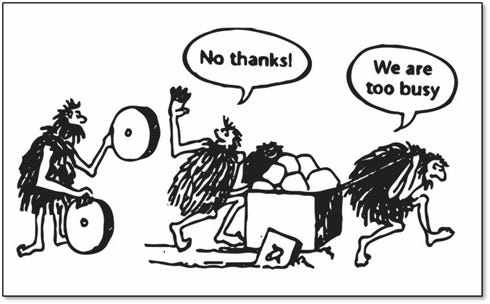Too busy? Time Writing Goals Together Pays for Itself
The sense of urgency in competitive environments can make people feel they don't have time to get clear on what the goal is. Let's dispel that fallacy.
There are so many areas of our lives where we make the same faulty trade-off pictured above.
In our personal lives:
We’re too busy to do exercise today.
When we are healthy we are more productive.
I am sure there are many of us, including myself, who coach people on being aware of such trade-offs in the work situation only to struggle with similar trade-offs in our personal lives.
In our work context:
We’re too busy to write unit tests.
We save time on every change now and into the future when we have a better automated test suite.
We’re too busy to talk to customers every week.
We are more productive when we build the right things because we know our customers well and waste less time building the wrong thing.
We’re too busy to write a better quality goal.
We spend more time during the quarter heading together in the right direction and can better course correct when we have a clear goal we all understand and smart ways to understand our progress.
And to be fair, more and more organisations have learned the above lessons. As a result, they addressed the imbalances that had led to poor quality, anaemic impact and the many other common consequences of compounded short-term decision-making.
An even smaller number of organisations have conquered this following frontier:
We’re too busy to do long-term planning.
We make winning choices when we consider the long-term. We can bring people on the journey when they can participate in the planning and understand the strategy.
When I say planning I mean alignment on the goals and the logic behind the ones we chose. How what we plan to do now links with where we want to be in the future and how we think we will get there ahead of the competition.
How this is currently manifesting in businesses which believe they are too busy to plan:
They do plan, but they don’t address the strategy so they may execute successfully but still get routed but the competition.
They plan their strategy but it’s not widely shared.
They plan but they allocate negligently small amounts of time to it - “we’ve got 2 hours to get this year’s planning done”
They don’t have approaches to co-create and evolve strategies with the “execution” teams.
How is your organisation at long-term planning? How well is it communicated? Do any of the above scenarios apply to your business? Are there other scenarios I missed? Please share your examples in the comments.
If you liked this post please hit the ‘❤’ below - it really means a lot to the author to get feedback.



